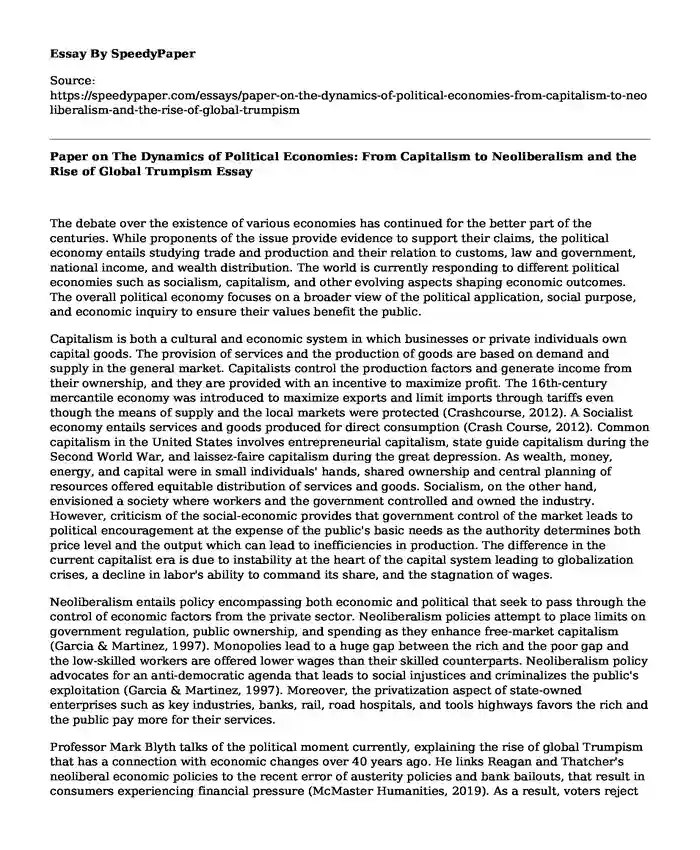
| Type of paper: | Essay |
| Categories: | Politics Capitalism Economics Government |
| Pages: | 3 |
| Wordcount: | 688 words |
The debate over the existence of various economies has continued for the better part of the centuries. While proponents of the issue provide evidence to support their claims, the political economy entails studying trade and production and their relation to customs, law and government, national income, and wealth distribution. The world is currently responding to different political economies such as socialism, capitalism, and other evolving aspects shaping economic outcomes. The overall political economy focuses on a broader view of the political application, social purpose, and economic inquiry to ensure their values benefit the public.
Capitalism is both a cultural and economic system in which businesses or private individuals own capital goods. The provision of services and the production of goods are based on demand and supply in the general market. Capitalists control the production factors and generate income from their ownership, and they are provided with an incentive to maximize profit. The 16th-century mercantile economy was introduced to maximize exports and limit imports through tariffs even though the means of supply and the local markets were protected (Crashcourse, 2012). A Socialist economy entails services and goods produced for direct consumption (Crash Course, 2012). Common capitalism in the United States involves entrepreneurial capitalism, state guide capitalism during the Second World War, and laissez-faire capitalism during the great depression. As wealth, money, energy, and capital were in small individuals' hands, shared ownership and central planning of resources offered equitable distribution of services and goods. Socialism, on the other hand, envisioned a society where workers and the government controlled and owned the industry. However, criticism of the social-economic provides that government control of the market leads to political encouragement at the expense of the public's basic needs as the authority determines both price level and the output which can lead to inefficiencies in production. The difference in the current capitalist era is due to instability at the heart of the capital system leading to globalization crises, a decline in labor's ability to command its share, and the stagnation of wages.
Neoliberalism entails policy encompassing both economic and political that seek to pass through the control of economic factors from the private sector. Neoliberalism policies attempt to place limits on government regulation, public ownership, and spending as they enhance free-market capitalism (Garcia & Martinez, 1997). Monopolies lead to a huge gap between the rich and the poor gap and the low-skilled workers are offered lower wages than their skilled counterparts. Neoliberalism policy advocates for an anti-democratic agenda that leads to social injustices and criminalizes the public's exploitation (Garcia & Martinez, 1997). Moreover, the privatization aspect of state-owned enterprises such as key industries, banks, rail, road hospitals, and tools highways favors the rich and the public pay more for their services.
Professor Mark Blyth talks of the political moment currently, explaining the rise of global Trumpism that has a connection with economic changes over 40 years ago. He links Reagan and Thatcher's neoliberal economic policies to the recent error of austerity policies and bank bailouts, that result in consumers experiencing financial pressure (McMaster Humanities, 2019). As a result, voters reject mainstream political parties that have failed to solve various issues such as a stagnating economy and inflation.
Leftism among political parties plays an important representative role among the disempowered. The forces of markets and capital tendencies produce inequality (Watson Institute for international and Public Affairs, 2020). The market-driven world seemed to take dominance as voters were connected to them, and political parties promised protection of their own as the economy changed. Keynesian economist attributes to speaking for the leftism on issues such as political-sensitive economic management and discretionary. Leftism reinvented advocates for socializing the electorate to a social way of thinking about the world and democratic demand.
References
Garcia, A. & Martinez, E. (January 01, 1997). What is Neoliberalism? Corpwatch. https://corpwatch.org/article/what-neoliberalism
Crashcourse. (September 6, 2012). Capitalism and socialism: Crash course history#33 [video]. YouTube. https://www.youtube.com/watch?v=B3u4EFTwprM&t=437s
McMaster Humanities. (July 16, 2019). Mark Blyth-Global Truimpism and the Future of the Global Economy [video]. YouTube. https://www.youtube.com/watch?v=KGuaoARJYU0
Watson Institute for International and Public Affairs. (March 20, 2020). Leftism Reinvented: Western parties from social to neoliberalism [video]. YouTube. https://www.youtube.com/watch?v=cP86Fk5AMQI
Cite this page
Paper on The Dynamics of Political Economies: From Capitalism to Neoliberalism and the Rise of Global Trumpism. (2023, Dec 18). Retrieved from https://speedypaper.net/essays/paper-on-the-dynamics-of-political-economies-from-capitalism-to-neoliberalism-and-the-rise-of-global-trumpism
Request Removal
If you are the original author of this essay and no longer wish to have it published on the SpeedyPaper website, please click below to request its removal:
- Free Essay for You: Relationship between Gendering at Work and Gendered Work
- The Mexican Ancestry, Essay Example for Students
- Essay Sample about Gender Inequality
- Free essay example: the Brexit deal and its implications
- Essay Example: Research on Sexual Education
- Essay Sample on Football Business and Marketing
- Essay Sample on Crisis of Liberal Democracy in Europe
Popular categories




